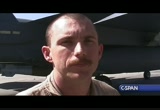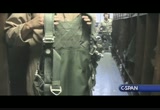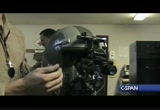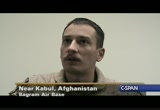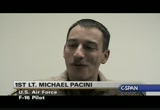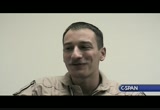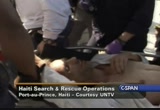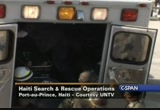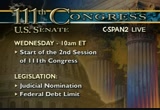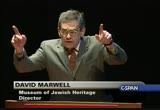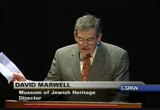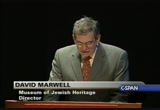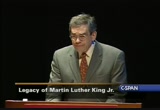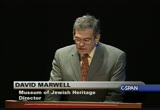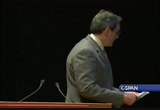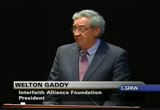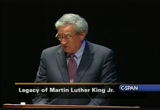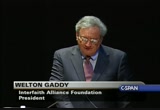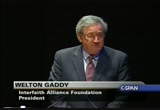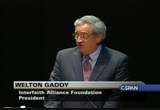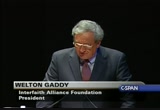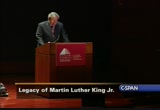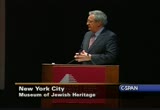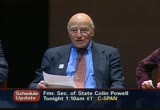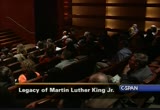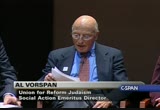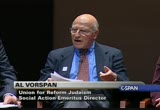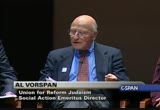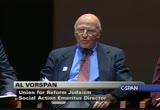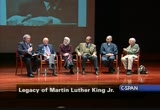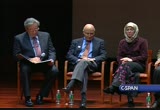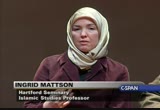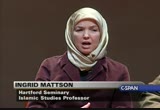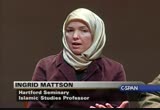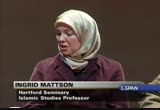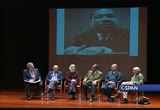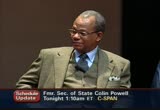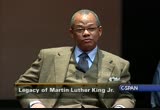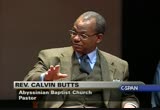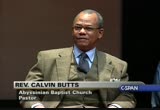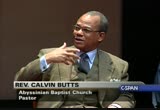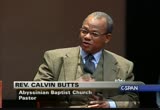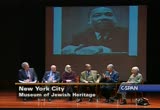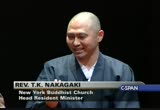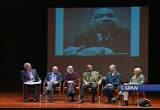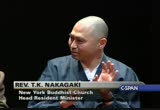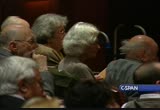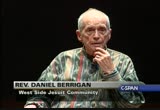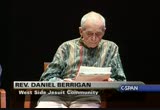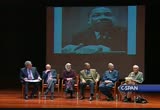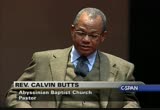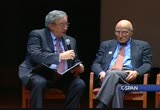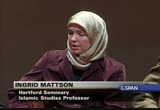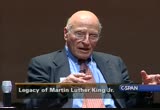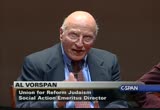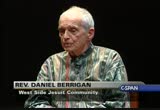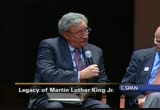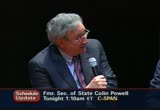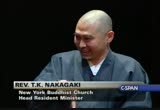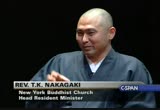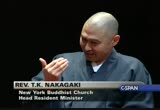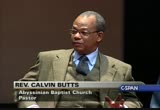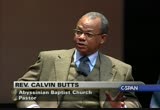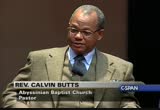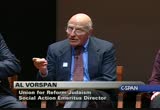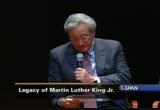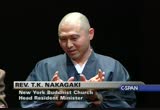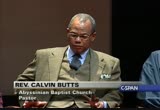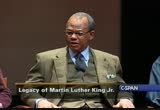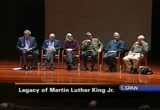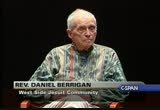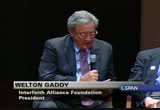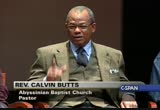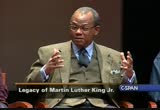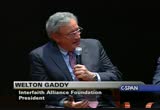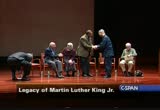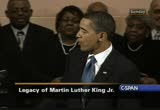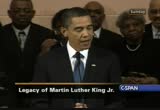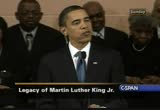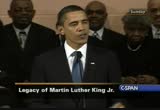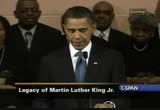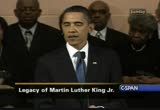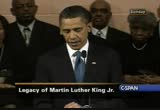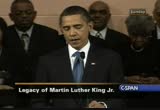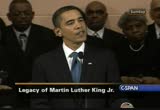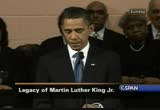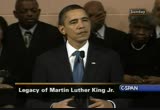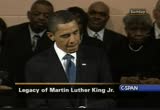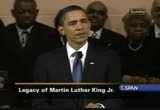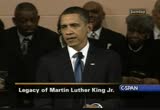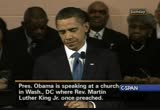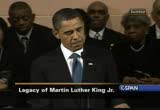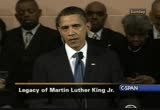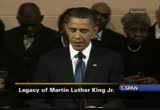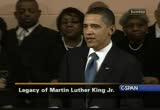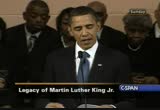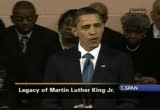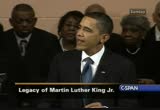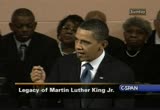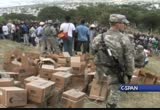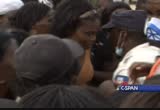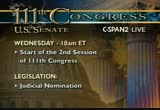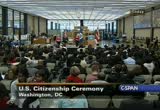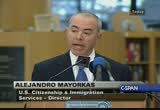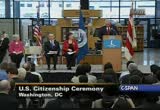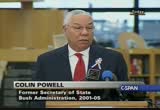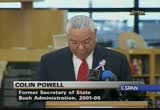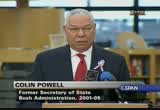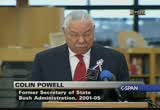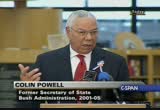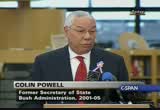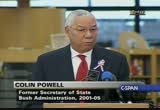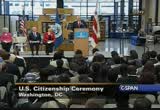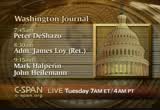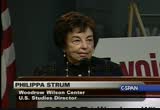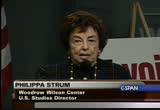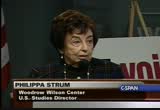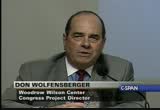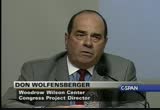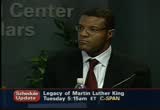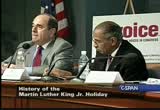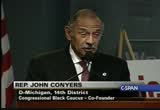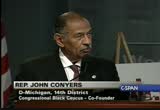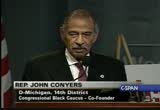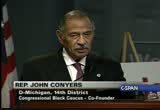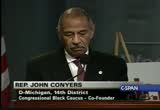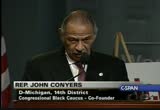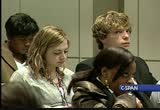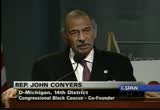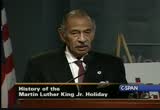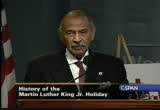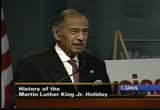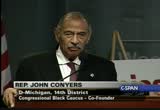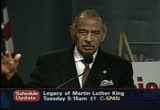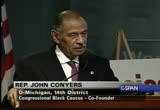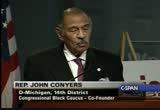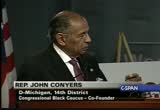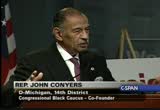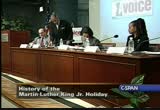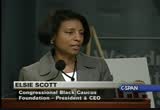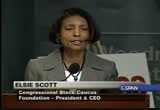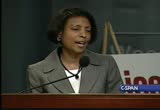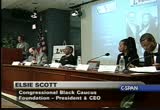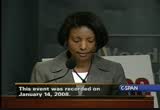tv Capital News Today CSPAN January 18, 2010 11:00pm-2:00am EST
11:00 pm
11:01 pm
>> this is the 20 millimeter gun. it's precisely targets with the small radius of the bullet, and it allows us to get precisely where we want to hit and not worry about a level of damage around it. >> is it tough as a pilot to use this weapon? >> it can be challenging, especially when we are at an ankle. this was built for air-to-air configuration.
11:02 pm
we have to point the plane significantly at the ground to do this. but it does precisely target where we want to and minimize collateral damage. >> this is our basic survival gear here. the various things that we may need if we end up isolated on the ground. in addition, we have our harness that we hooked up to the aircraft with. in the event of an objection, this attaches us to the parachute. we have our cheese suits here -- g-suits here. we use this when we sustain the most g forces, shooting a gun at
11:03 pm
the ground like i talked about before. we're pulling away from the ground when we get the g forces. this is more work out stop and our training maneuvers to help us so that we do not pass out in the air from the g forces. >> that would be bad. >> it does not happen too much in afghanistan but it is more air-to-air combat. this is this guy in -- the standard fighter combat helmets. some editions we have to this one, a built-in light to use that night, and the night vision goggles attached to the top of our helmet. that is some of our best weapons, to be able to see the ground.
11:04 pm
for some of our night missions, actually all dark night visions, we will attach these night vision goggles. it uses the ambient light in theater. the only drawback is that they can be kind of heavy after four or five hours. it is similar to that on a guy's head. this allows you to use any kind of light on the ground, any gunfire, tracers, anything like that. allows you to see what is going on down the ground. >> deal ever get a chance to interact with people on the ground? >> absolutely. we get rest and recuperation, all we will come back here to baraki barak -- bagram.
11:05 pm
we can get feedback and get help to do it better next time. it is very rewarding. >> sometimes we just search location and it is slow pace. and then other times things picked up. it is five hours of boredom and 5 minutes of terror, i guess you could say. our guys were looking at a location and there are taking small arms fire from the hills. they are trying to get out of those locations to not get shot. they had to drop the bomb on a hillside to stop the firing. once the bomb hit, any activity ceased and they are able to get out a bit. it was a very rewarding mission.
11:06 pm
i was watching when and ied went off. the whole platoon was on foot and got hit by the ied. we went down and did a show of force. we let the assets know that we are here now. our show a presence make them stop and lead. and our guys were able to get out of there. they were able to get the guys hit by the ied into the hospital. our show of force was showing that we were coming. it's just being loud in being there. >> de you physically support people on the ground? >> this is unique. if i had been able to, i definitely would have done that. >> winning the hearts and minds
11:07 pm
of afghans' depends on not killing innocent civilians. how do you emphasize protecting the civilian population when you door -- when you're doing air strikes? >> to do everything within our power to make sure that the enemy who is trying to drop into this dilemma by using innocent people as human shields, to never allow them to draw us into that dilemma. the enemy will fight from a village. they will literally bring women and children into a house and she it from that block, knowing that women and children will keep them safe. we do everything in our power to not engage, to avoid those situations where there could be innocent people involved. president obama, rightly so, and general mcchrystal brought a new way of understanding what is
11:08 pm
going on here. business as usual, the american way of fighting a war, changes, and it changes such that we take more care to make sure not one innocent person dies if at all possible. >> i have to ask this. apparently fighter pilots like to grow moustaches. why is that? >> the vietnam era, they always grew mustaches. when-shaped his mustache and the next day he got shot down. he was not going to say that, he shaved it, and he got shot down. >> what about guys it cannot grow moustaches? >> that is too bad.
11:09 pm
>> i saw some wearing fake mustaches. >> free-lance journalist david axe was in afghanistan in october and november. you can find these on our web site, c-span.org. in the search box in the upper right-hand corner, type a x e. >> delicate international workers looking for people buried in the rubble of the united nations -- united nations mission. [applause] >> media, move back.
11:10 pm
11:11 pm
11:12 pm
a number of minor bills. later in the week, a question about similar legislation after the indian ocean tsunami in 2004. live house coverage on c-span. and the senate returns on wednesday 10:00 a.m. eastern on2 on to start the second session of the 111th congress. that will begin with a judicial nomination, and then began debate on raising the federal debt limit. before the holidays, congress approved a temporary debt ceiling. all the floor, leaders are working with the white house on a health-care compromise. house democrats are caucusing tomorrow to discuss agreements reached so far. senators will also be off the floor on wednesday. news reports say that agreement was reached on portions of the health care legislation.
11:13 pm
>> did you know that the number one free news app is c-span radio? you can get quick and easy aspects -- access. there is also what tab that links to all of our podcast, including "q&a" and afterwards. it is all free and available from the app store. >> in honor of the legacy of dr. martin luther king, the jewish and other leaders held an interfaith discussions on the relation between spiritual practice and social change. they also talked about the lessons of justice and equality that inspired their early activism. this is one hour and 20 minutes. first, remarks from david marwell.
11:14 pm
i want to welcome you to what promises to be moving program. before i began, i would like to remind you all to do what i have forgotten to do, turn off my cellphone. which i will do now. and also to point out, as the new york city law requires, but various fire exits are marked over there, and off the stage left, and the two exits in the back it take you back to the lobby and to ride apart. -- radnor park. our program pays tribute to the legacy of martin luther king, jr. and his inspirational teaching. our distinguished panels of religious leaders and activists, and i will introduce them in the order that they are sitting, al
11:15 pm
vorspan, dr. in britain -- in grid mattson, and others. they join us to discuss the role that haiti has played in their own social activism -- that faith has played in their own social activism. their complete biographies are contained in your program the group will be led a discussion by dr. gaddy, and after that discussion they will be glad to take questions from the audience. please write your questions on index cards that will be distributed to you, and they will be collected. the museum is presenting tonight's program with the
11:16 pm
interfaith alliance foundation. rev. dr. gaddy is the president of the interfaith alliance. it is committed to informing the public about our nation's longstanding commitment to to religious freedom and current issues at the intersection of religion and politics. i want to pay a special thanks to our former colleague, ari gellar, for his help in arranging tonight's program. this program is dedicated to the memory a civil rights advocate and a great friend of this museum. andrew goodman, her son, along with others in the summer of 1964 went to philadelphia, mississippi to register black voters. when they went out to investigate the burnings of the
11:17 pm
black church, they were arrested on false charges and eventually released into the custody of members of the ku klux klan who beat and murdered them. it took the fbi 44 days to find their bodies. a copy of the missing poster is a permanent part of the museum's four exhibitions, reminding all visitors that our actions to matter and that none of us is free unless all of us are free. after andrew's murder, his mother carolyn became synonymous with the civil-rights movement. she carried on andrew's work. she spoke annually here at the museum in this very room to work gallery of educators, inspiring them to social justice and activism and reinforcing the importance of their work here at the museum. when she spoke to audiences in this theater, she shared intimate details of her family
11:18 pm
life, like when she revealed that as he packed, and she stuck mantises into his duffel bag when he was not looking, just in case pier -- she's that bandages -- she stuck bandages into his duffel bag when he was not looking, just in case. she can be heard on the audio to work recalling her son's decision to go to mississippi. he said, they are americans. they should have the right to vote. they are not permitted to vote. he needed his parents' permission to go. she and her husband were very anxious, but in her words, we thought, how long the world could we possibly say note to andy and not give him our permission? her sole shown through her grief and she dedicated herself to telling the story of these three young man and the hope that they
11:19 pm
could and still and future generations. she was a guiding light and an inspiration to the staff at the museum, and she is loved and missed. one of carolyn's three sons, and his brother, david goodman and his wife sylvia, are here in the audience this evening. david, could you share it -- could you stand for a moment? [applause] and now like to introduce dr. gaddy. >> thank you so much and thank you for being here this evening for what we know will be a stimulating discussion. the interfaith alliance you do not know, is a national organization that considers individual rights and matters of personal conscience to be sacred.
11:20 pm
that is why we are both for fayed and freedom. for more than 13 years, we have been working to protect the integrity of religion and the vitality of democracy so that they can force together. for that band, we challenged religious and political extremists to see -- who seek an entanglement of the institutions of religion and government to not threaten individual liberty and religious liberty. it is an honored to be moderating a discussion with this distinguished panel. i am profoundly grateful for the opportunity to work with the misery of of jewish heritage, a living memorial to the holocaust, and i am thankful for the invitation from the museum that made this cooperative effort possible. some 40 years ago, dr. martin luther king, jr. said, "if we
11:21 pm
are to go forward, we must go back and rediscover those precious values that all reality hinges on moral foundations." of course, a major question of our times is how to translate religious and moral values, the ones of which dr. king spoke, it to the priorities of our society and into the work of our government without compromising the guarantee of liberty for all people, regardless of their religion or lack of religion. tonight as we remember and celebrate dr. king's light, we will be compelled to respond to that the man in question. dr. king, like few other
11:22 pm
people, embodied an exemplary relationship between spiritual practice and social change. it had an appeal that transcended traditional divisions within the nation. that is why it is so very fitting for this evening's panel to involve outstanding leaders from the jewish, muslim, buddhist, and christian communities. you already been introduced to them and there is information about each of them in the program that you have been handed. the civil rights movement that dr. king champion was the perfect example of the positive and healing role that religion can and should play in public life. dr. king's sermons, speeches, and even his acts of civil disobedience inspired and unified the american people in a time that was marked by harsh
11:23 pm
divisions and unpleasant hate. but the strategies of his work and the substance of his works, we have a lot to learn, especially in the midst of hotly contested primary elections involving deeply divided and seriously divisive partisan political campaigns. dr. king's dedication to his message of hope and justice was deeply rooted in his personal fate. but his message about that resonated with all people of faith and goodwill, not just the members of his baptist fellowship. dr. king focused on core religious values that coincide with basic democratic values. his call to let freedom ring
11:24 pm
recognized no exemptions, no conditions, no special preferences related to that freedom. little wonder that his summons to liberty echoed in temples and mosques and churches of every variety. dr. king sought fulfillment for the founding vision of our democracy -- not the establishment of a sectarian religious ideology. dr. king's sensitive translation of spiritual practice in the social change during the civil rights era stands in sharp contrast to the divisive and partisan tactics so prominent in our nation today. he spoke to democrats and republicans to say -- the same way. his interest was not to curry
11:25 pm
favor but to contribute to the common good. the issue was not partisan politics, but civil rights. not party loyalty, but social justice. dr. king was preeminently a religious leader. dr. king went to church regularly, not to be able to use religion to which she but partisan political goal, but to allow religion to use him and to shape his involvement in pursuit of a goal rooted in creation and affirmed by the nation. his religious identity shapes everything else rather than allowing everything else to shake him. dr. king did not go to a gallup polling to find his values. or to head of the republican national committee or the
11:26 pm
democratic national committee to find his direction. his fayed and values and direction came from scriptures and conscious -- his faith and values in direction came from scriptures and conscience. not surprisingly, we remain committed to a dancing a positive policy agenda in keeping with dr. king's council that all reality hinges on moral foundations. and to be sure, partisanship is part of an election cycle. but our nation needs more than that. it is time for bipartisan coalitions of people of faith and goodwill to come together to
11:27 pm
tackle meaningful issues like hate crimes and racial profiling and basic protection for civil liberties. neither he nor bigotry qualifies as i there are religious -- neither hate more bigotry qualifies as a religious value. we are challenging candidates and their campaigns to remember the quality of dr. king's leadership. this man is engaged in politics to improve life for all people. his goal was not winning an election so much as securing justice for everybody. his strategy was not dividing by uniting. dr. king knew both the pressure and the prize related to political endorsements. to his way of thinking, compromising his prophetic ministry was not worth the gains of declared partisan loyalty.
11:28 pm
dr. king never endorsed a candidate for public office. of course, religious leaders have to talk about politics if they are going to discuss public policy. and we will do that even tonight. but never should we suggest that one candidate is god's choice for the leader of our nation, or that one party has exclusive claims on our nation spirituality. spiritual practice should never become a political strategy. rather, it should remain the source of values that unite diverse people of all religious traditions and no religious tradition and facilitating social change that moves us closer to the mission of our founders, and to the promise of dr. king's beloved community.
11:29 pm
you have already met the members of this panel. i am going to ask each of them now to make an opening statement about three minutes. that is a challenge in itself. and i want to end at three minutes to talk about the nexus, the intersection of your spiritual condition and your social action. what is the relationship between the two in your personal life? al vorspan, we will begin with you. >> we've just heard a brilliant statement. i'm ready to sign on to the statement. every statement that the moderator said is worth about that. we can drive a truck through that.
11:30 pm
i have always said that being speeched to death is a form of jewish capital punishment. but we have great speakers here and i am going to try hard to make this brief and personal. i am old enough to have lived through a depression. i am old enough to have gone to jail with martin luther king. i am old enough to have fought in world war ii. i grew up in st. paul, minn. at a time when the twin cities were known as america's capital of antisemitism. jews were discriminated for everything, houses, public accommodation, even service clubs and automobile clubs.
11:31 pm
the rest of america was not much better. that is one of the reasons why a record of america with an administration beloved by jews raised only a feeble voice against the holocaust. that was then. now, of course, the twin cities are among the most enlightened communities of america, the place where they have had several jewish senators, several black officials, a flourishing of the community. it has transformed itself as america has been transformed. and i want to ask the question, what happened? how did that happen? we do not have time to get into many of the reasons but the most significant was the powerful tide of the civil rights
11:32 pm
revolution. it simply knocked down a closed society of my youth, knocking down the walls of the segregation and discrimination, opening the doors of equal opportunity to blacks and jews and all but -- and ultimately to women and to gaze and to people with disabilities. martin luther king jr. was not the first or only zero but he was profoundly a part of america. in my lifetime, no non-q with the possible exception of franklin delano roosevelt had the same clout that martin luther king jr. had with my community. martin luther king sent a telegram to the commission. i need you tomorrow. i need you tomorrow. in st. augustine, florida.
11:33 pm
we need you tomorrow. because we are challenging segregation in public facilities. 17 people were on a plane first thing in the morning. i was one of them. we met martin luther king, and he answered the question that you just ask. what is this all about? it was not just about justice. it was something profound and spiritual and moral that went to the root of our beliefs as jews and he invoked the hebrew profits in a way that was amazing to everyone of us. -- the hebrew prophets in a way that was amazing to every one of us. within a few hours, we were in jail for the crime of sitting down and having lunch. that is what we were arrested for. sitting down and having lunch
11:34 pm
with fellow americans. and we were turned over to the tender mercies of a name that still sits in my head, osman is a -- hoss menucie. the chief of police and the grand wizard of the complex can in that county. the same guy. the difficult klutz klan in the county. the same guy. -- the grand wizard of the clue klutz clan in that county. the same guy. why we there? what does this mean? martin luther king was extraordinary in ways that you do not see much today. to him, justice was a seamless web. it was not just what was happening to blacks. he was deeply outraged by
11:35 pm
antisemitism. by rachel how -- profiling. it was all one thing. he spoke about soviet jews in the same power. he condemned antisemitism even when it came to black leaders. martin luther king was of person willing to face greater popularity, even within the black community. i remember the riots, the intellectual and moral riots that broke out when he decided to come out against the war in vietnam. it was regarded by many black leaders to be politics. on wise, dangerous within the community. that never stopped martin luther king. martin luther king embodied the conscience of america. he stirred my conscience. it wasn't justice and
11:36 pm
antisemitism -- it was justice and antisemitism that turned me into an activism. fayed came later. -- faith came later. he died in meant this but the contents of martin luther king has never die. -- he died in memphis but that conscience of martin luther king has never died. [applause] >> thank you so much, al. we have a television audience so i want to say something about you. he is director of social action and the author of many books.
11:37 pm
dr ingrid mattson is professor for islamic studies at hartford seminary. she is also president of the islamic society of north america. >> i certainly feel that i am surrounded by giant said day. -- giants today. you wrote a book about giants, and you could be a chapter extended into that in the future. i am grateful to the legacy of what you have done with martin luther king. and tonight we are here to remember his legacy. it is important for us to be grateful and to show that
11:38 pm
appreciation for all those who made his work successful. because he could not have been done along. i am very humble to be here. you hear about being thrown into jail for sitting at a lunch counter and being handed over to the head of the clue klutz clan --ku klux klan, that is unimaginable. we have to grasp that sense of it being unimaginable. during that time, in the middle of the struggle, it would have been unimaginable to many of those people that we would be here today, that we would be living in a time when not only would whites and blacks be sitting together eating, marion, being the closest of friends,
11:39 pm
but there would be an african- american running for president of the united states, that there would be a woman running for the presidency, that there would be a jewish museum in new york that had such a place of prominence, and that people of all faiths are coming to in humility and appreciation. for me, the relationship between fayed and social justice -- faith and social justice hinges on imaginationfaonith -- on imagination. faith this may be reality. it is a cheap. with work, with struggle, but it begins with vision. i think this is why it is the first four words of martin
11:40 pm
luther king's famous speech that resonate mostly with us. i have a dream. it is that ability first to be able to say that the reality that we are living in -- and when we talk about social justice, we're not talking about simple change. it is not a question of changing one relationship or one wall. deeply affecting the social structures, economic structures, all that at all different levels and regulations, municipalities, counties, laws, how many changes had to happen in society 40 years it does for us to be where we are today -- 40 years ago for us to be where we are today? people fall back into pessimism and say that it is impossible for things to change, people will never change. when i hear people discussing many of the problems that plague the muslim global community, i
11:41 pm
hear things like, well, those are rivalries and hatreds that have gone on for thousands of years. people will never change. that kind of pessimism speaks to me to a lack of imagination, whether secular or sacred. and i get my confidence, i get my courage and my strength from that belief that all things are possible. with god. and that we are his instruments driven to make that change possible. there's a beautiful person the koran that says perhaps god will put that into the hearts of those who now considered enemies. perhaps, can you imagine. and what is interesting about
11:42 pm
the wording of this first is that those to you now consider enemies. it is not that they are your enemies but at -- but it is a question of perception. you have to be able to a match and, even in the next passionate emotion, negative feeling, and perhaps even real struggles that are political, that may even be military, that in the middle of that there is a possibility that one day you will be france, and not only france, but people with love for each other. -- you will be friends, and not only plfriends, but people with love for each other. how many of us have had that experience in our society and individually? that is the beginning point of a successful relationship between faith and social justice.
11:43 pm
[applause] >> next we will hear from rev. dr. calvin butts iii. >> thank you. mine is an inherited faith that found its fruition for practice and imitation. my spirituality comes largely out of practice and were shut -- in worship an imitation of those that went before me. i inherited the faith of my parents. they took me to church, and courage be in church, and it was
11:44 pm
there in the worship experience of church, primarily the sunday school, that i learned about god. in that learning, i learned a number of things, most important, scripture. the scripture that said, one day the lion in the lam with light down together. the scripture that said, the land would flow when they with milk and honey. the scripture that said, one day every ballot would be exalted and every mountain and hill made a low. and i would hear that over and over again. one of the things that struck me about our rabbi from nazareth was that one of the scriptures that he quoted in the beginning of his ministry said that the spirit of the lord was upon him, because it had anointed him to
11:45 pm
preach good news to the poor, the recovery of sight to the blind, to proclaim the favorite year of the lord, to let the victims go free. these things stuck with me because i heard them over and over. i heard them in the context of sunday school and in that context of worship. but they began to live for me in the person of martin luther king, jr. i understood the notion of salvation through sacrifice. i would hear the scripture that you opted for kiev 70 * 7 -- that you ought to forgive seventy times seven, and to pray
11:46 pm
for those that despite fully use you. i began to pick up as behavior from my parents and my relatives. but it was made very real in the life of dr. king. i was influenced heavily by any number of great prophets -- malcolm x. i read the intensity of frederick douglass, harriet tubman -- i read about them. so turner truth, so many more. -- sojourner truth, so many more. dr. king was there. i never touched him but you know what i mean. i would sit in the living room and watched the marches has a younger man.
11:47 pm
and then my mother went to the march on washington. i look for her in the crowd. and i could hear the energy and i could hear the words of that prophet, that rabbi, love your enemies. i saw the pictures of the ku klux klan, saying, we're going to get you. and my mother would tell me not to worry. i heard about the bus is being overturned. i heard about a young man who got his brains knocked out, a unitarian minister. that three young men. i followed that. i would hear in dr. king and see
11:48 pm
it, love your enemies, pray for those who despite fully use you. my god, it was living. how do you do that any young man that was angry? i would remember the sunday school leaders. these only come out by prayer and fasting. you begin to understand more deeply this rabbi from nazareth , and this man who is leading this nonviolent army, and then the ultimate devastation of it all, yet the great devastation and salvation of it all. he is assassinated. the rabbi was nailed to a tree. his for runner got his head cut off. there is the salvation but that
11:49 pm
the shedding of blood. -- there is no salvation without the shedding of blood. still with bloodshed, hatred, and yet dr. king's voice from that young rabbi, coming out of the torah, i believe, love your enemy. and he was assassinated, crucified. and then i could not get it. my spirituality was shattered for a moment. and i was angry. but the route was good. -- root was good. even the flower faded for a moment, there was a recognition.
11:50 pm
we can see that this is good development of spirituality, we look with a scatological lies -- with eschatological eyes. i was trying to figure out what the power was. and then it comes back again. you can kill the dreamer but not the dream. all of the scriptures come back and so your spirituality deepened. therefore by the time i get to ministry, i received a call, and then i know what i have to do based on my spirituality. go out and proclaimed the favorite year of the lord, preached the good news to the poor, the recovery of sight to the blind, and let the broken victims go free.
11:51 pm
what are your wages? you will be killed. but i -- but by then your spiritual audacity, you are so spiritually brurooted, you're not worried about that anymore three remembered dr. king's words. longevity has its place but it does not really matter. i have been to the mountaintop and i have seen the promised land. so with that faith, i'd go about doing what it is i feel god has called me to do, and whatever arena i find myself, thanking god for the presence of a young rabbi who yet lives in me, and for the memory of martin luther king, jr.
11:52 pm
>> reverencd nakagaki is the buddhist temple in -- chaplain at columbia university. >> good evening, everyone. i'm going to start with martin luther king, jr. what impressed us with the nonviolence part. i grew up in japan so much is not uncommon with other people, but the nonviolence that he always used, i understood that they went back to the gandhi. and that goes back to the king who was killing before but he became the peacemaker.
11:53 pm
it comes to the way of understanding buddhism. part of the buddhist practice are probably two things if i can make it so simple. cultivating wisdom, to be able to see what is really going on. the eyes are very important. you may not -- if you cannot see what is going on, you may have a problem. there's also understanding interdependence. my happiness is not just i become happy, but everyone else becoming happy. and i finally become happy. in order to have such eyes, you have to have compassion. the second part of that aspect of buddhism is compassion, cultivating compassion.
11:54 pm
and in practice the compassion as well. nonviolence that born with the king, jr. practice. -- that martin luther king, jr. practiced. i don't know a fight to speak about personal parts, but i was a university, new york university, and i spoke to the english-speaking society as a club. the first speech was the famous "i have the dream" speech. free at last, free at last. that part keeps coming back to my brain. that was my first speech i ever memorized. now i am getting old.
11:55 pm
that particular phrase i still remember. but the freedom itself is not just the physical freedom that i think he is talking about, which is part of buddhism to. you're mine should be free, really. -- your mind should be free, really. if you are angry, you don't do anything good in the buddhist sense. in a way, the mind embodies the word that we're talking. they are connected in buddhism. the action part is the body that we use, but what kind of mind you have is very important. when i hear the speech of martin luther king, jr., it is always coming out of the mind of compassion, the happiness of our
11:56 pm
self and other people, too. if you have the mind of by this action, we bring happiness to all the other people, then you had the social action to go with it. but if you come from anger, you create something that -- no one in buddhism creates more anger. in terms of what kind of mind we have, it is very important in the buddhist religion. sometimes i do involve a lot peace movement, because i am from japan and that is the only country so far that has experienced the atomic bomb. i wish that we could be like this at a peace museum. it would be difficult because the first person to ever use the
11:57 pm
bomb was the united states. if we built the peace museum right in front of the white house, that might be amazing. [laughter] i have a dream that i can establish a peace museum in this country. so that people can appreciate peace and the practice their peace. thinking about my happiness and other people's happiness together. i don't know where my thought is going. and my point is again, that mind, what kind of mind you have to do any action, that is the important part. [applause] >> father daniel berrigan is a renowned catholic priest.
11:58 pm
he speaks for a lot of us. >> i did a lot of thinking these last weeks on the topic of this evening, this whole business of the heritage of dr. king. and i thought about the treasure transmitted to us, and what does it mean to be an heir to his heritage? and then i came upon an extraordinary document that i had never heard of or have forgotten about. it was written in april 1968 in central park. one could recall that dr. king had been murdered shortly before, that bobby kennedy was
11:59 pm
that same summer, and that this was not and not all little if any of loss -- if this was not enough of a litany of loss, another died. i wanted to refer especially to the magical access of this gathering in central part led by coretta scott king. weeks after the death of her husband. she has this to say. "my dear friends, i come to new york today with a strong feeling that my beloved husband snatched suddenly from our midst more than three weeks ago would have wanted me to be president -- present today.
12:00 am
the law heart is heavy but grief having suffered an irreparable loss, my faith is stronger today than ever before. i have suffered an irreparable loss and my faith is strong but that it ever was. as many of you probably know, my husband had accepted an invitation to speak to you today. had he been here, i'm sure he would look to your hearts and levels of understanding. i would like to share with you some notes taken from my husband's pockets after his death. he carried many scraps of paper on which he wrote notes for his speeches. among these notes was won which were perhaps early koch for the message he was to give you today. i will read them as he recorded them.
12:02 am
9, thou shalt not believe that they will support the united states. 10, thou shalt not kill. i am speechless all to your benefit. [laughter] i found myself looking at those lines. i thought it was a very accurate mirror. [applause] >> thank you so much. this is rich material. we will have to move rapidly now like a minute and a half for
12:03 am
some questions. you will have an opportunity to write down questions for me to raise as well. you were a student at morehouse in the 60's. you got to attend some rallied and hear dr. king and lecture. -- attend a summer rallies and hear dr. king lecture. what did you find in the contemporary black community iof the deep feelings that you have for dr. king? isn't shares it shared? what is his legacy in the african-american community today? >> i think his legacy is strong. the deep feeling i felt concerning his life and death, i
12:04 am
do not believe it except for those that are in my immediate age range or older and just a bit younker are shared today. many people of all races do not know who dr. king really was. the unconscious missionary faith of the west materialism has greatly influenced our society for the worst, in the sense that when dr. king -- when you know that he died, he was broke. he did not have a lot of money. when he risked all like any of the profits we have mentioned, for the sake of humanity and social justice, that feeling in not just the african-american community -- in most of our
12:05 am
communities, but any faith is just about gone. i think that -- you have to remember something else that was very much a part of me and a lot for my generation. my faith was inherited initially. it was passed on to me. many of our young people today, many do not go to synagogue or church or temple for to the mosque. they really -- in the united states. they really do not, i think, did not understand the depth of dr. king's spirituality. and the spirituality of the young men and women who were with him in this effort across
12:06 am
all lines. we are hurt as a nation because of that. >> >> we are meeting a few blocks from where the world trade center stood. one of the consequences of that day has been a rising fear and misunderstanding of the muslim community i. is there something to be learned from dr. king in helping those slum community faces the situation that is -- how the most frmuslim community faces te situation today.
12:07 am
>> absolutely. there are many that stories about our young people these days -- the kind of discrimination and suffering of our children -- post 9/11 children have gone through and have gone through great hardship. they face it regularly. they are called terrorists and all sorts of names. this feeling of anger at being mistreated and unfairly targeted is the natural reaction. we need good role models. we need to give our young people an alternative to simple anger. i remember sitting at my son who is m-16 a few years ago working with him on a project for martin
12:08 am
luther king jr. day. it was such a wonderful time to discuss issues with him and discuss his feelings of being picked on and to make sure he would not be a victim. it is an enormously rich and powerful resource for us -- and his role model, which does all of the more powerful for us and the community because it is reflective send examples of earlier profits including profit muhammed -- prophets including prophet muhammed.
12:09 am
we have that example from our own religious history and spirituality as well as a very contemporary example that is so important for us. >> i want to make a few quick points. we are forgetting that martin luther king himself was subjected to harassment, from violations of civil liberties, to force his wife into suicide, and to efforts by the government of the united states -- i am not talking about some racist but, but j. edgar hoover and did the fbi in seeking to destroy martin
12:10 am
luther king. the argument was communism. we have to silence martin luther king. that was the government of the united states. i have no doubt what he would say about the iraqi war and the harassment and persecution of innocent people because of their religious faith. he would be a very strong advocate of those constitutional liberties which are being eroded before our very eyes. i am very grateful for what you said. i am very proud of that your organization and my
12:11 am
organization have entered into a relationship to deal with this to reach out to the moderates and the people who respect tolerance and diversity and who are willing to fight harassment and racial profiling and willing to speak out. one of the most important things set on the marsh -- marched on washington said by a russian king from berlin. he said there is one thing that is worse than bigotry, that is silence. martin luther king would not be silent about the things we are facing today. >> what has happened?
12:12 am
your radical act group after catholic spirituality. what has happened to the spirituality in that tradition and others that have left us without the kind of passion needed to address some of the very issues that we just heard mentioned it? >> we do not have all night. that is a very loaded question. it seems to me that when the truth is in the air, even when it is well received, [unintelligible]
12:13 am
12:14 am
one as connect lawmaking in more preparation in the human misery on the other hand. that stayed with me and helped me take the next step. >> i want to ask a question of you. i can remember -- i grew up in west tennessee during the civil rights. i know what dr. king was called. i know the threats made against him. we listened to a brilliant lecture on situations around the world which involved military conflict.
12:15 am
i remember you raised your hand and asked, are there no alternative? the nets have any alternatives to military conflict? i have never seemed that person stunned. how is it for you to live? you keep talking about nonviolence. >> it is certainly difficult. i have to talk even now. even on this painful, -- even on
12:16 am
this panel, i have to talk which is painful. [laughter] you do not know you talk. talk is very important in the eastern tradition. that should be coming out of the silence. you cannot stop the silence any more if it sought from the beginning, that is not very nice. balance is very important. we do not say yes or no, this is what this is wrong. nobody knows what is 100% right
12:17 am
12:18 am
beyond the anger fits the loving of your neighbor. you get angry, that is the reality. yet, in need to have a base beyond the anger. that is the foundation that we feel we can bring. >> someone is going to bring the questions from the audience. while that is happening, and what is your favorite memory of martin luther king jr. or a story? >> i believe that it has to be
12:19 am
without question -- there are two. one is the march on washington speech. i was watching it on television. i started out watching it, i was lying down. when it was over, i was standing straight up. the second was something that i did not witness but have only heard. or read. he was standing in his kitchen after terrorist type attacks on his family and home, and he was wondering if it was worth it at all? he felt like he was going to give up. there was a negative light golden hanging over his head, a pair kitchen table -- bare
12:20 am
kitchen table. he said at that moment of deep despair and frustration and resignation that he heard the collective unconscious of his people speak in the words of the negro spiritual, sometimes i feel discouraged and think my works are in vain, but then the holy spirit revives my soul again. he got up and kept working. >> whoever wants to answer, please do it as quickly as you can. this could go on and longtime. the constitution is god's document -- where -- how do we
12:21 am
as activists demonstrate no more tolerance of such lack of tolerance? >> the individual person who speaks in the sense that you argue for debate or refused what has been said, you do not say anything. he tried to say it as intelligently as you can. if you feel that anyone has made a statement that is just so i of line with what you believe and who you are, then you have to try to the best of your ability to say something about it. >> after hearing statements
12:22 am
about religion and faith, does it do more harm than good? i think all of us have fallen into a trap. what about the american who does not have the faith? what about anyone saying i have no faith and running for office? constant in america sometimes needs to be a repudiation of fate. -- a fate. -- conscious in america sometimes needs to be a
12:23 am
repudiation of faith. [applause] >> how can we contribute to raising the spiritual essence or consciousness if the collective view is experiential? how can it be brought where people are not used -- where people are not lead to that particular? how can we contribute to raising the spiritual essence or consciousness among our young people? >> daily life and faith and
12:24 am
never suffered. -- separate. [unintelligible] watson my case, i feel like it should have been separate. live your life fully and tried to understand the meaning of life. that may be more spiritual than what other people think. be aware of the influence in your life. >> the most will be filled on martin luther king holiday. many areas are mostly segregated.
12:25 am
where is the hope? >> you cannot let the secularization of a day like king's birthday or the celebration of his birthday destroy hope. hope is everywhere you see anyone as trite as it may sound, celebrating the day in terms of reading and inspiring or working towards providing a better quality of life for any human being anywhere. every prophet has been destroyed and people left thought that hope has died. and yet we continue to save the
12:26 am
expressions of our faith and spirituality everywhere. if it is an african-american running for president or a woman running for president. more and more people are beginning to be engaged in protest against this war. what ever it is. the malls can fill up all they want and people can sell cars, but hope springs eternal. every time i turnaround in today's world with all of the negativity there is, there is something that happens that makes me say, there it is, a
12:27 am
reason to keep on living and working. we will see, god is not finished. we will see a major move of god that will confound us all and say, look at that. i never thought it. people saw martin luther king jr. marching, african-americans and women in jewish persons gaining in society. people thought, i never thought it would happen. look at that. >> this is from someone in the audience. i was privileged to be one of your students at cornell university. in the fall of 1967, you awakened my conscious by your
12:28 am
12:29 am
12:30 am
tell them what you said today if you are going back. they're writing began to change. there were questions about conscience and violence and what kind of a response to have. i began to deal with their peers and so did they. there was some awareness and anger and acceptance and growth. it was quite a time.
12:31 am
that was the simple way i operate it. and want to lead a life for the of dr. king. wha>> is a random that martin luther king was african american or is there something inherent to that culture or movements? could someone like him have existed in another ethnicity at another time? >> absolutely. not only could they, but they did. i talk about prophets,
12:32 am
12:33 am
in the midst of the presentation of that speech on television, some youngster from whatever religious background is going, what? they will become engaged somehow, and it will be unbelievable what will happen. i want to say one more thing. we are talking about spirituality and how it influences our social actions. we think of spirituality in the sense of that which is good, but you cannot underestimate ever the power of evil. i think it is one thing people do not want to deal with. martin luther king jr. got
12:34 am
assassinated. they shot him. jesus was crucified. we can go on and on. when you talk about hope and it seems like it is not around or whatever, and the evil that opposes us is not coming after us in polite discussion. think about hitler and what he was trying to do. this is overwhelming, and many people will not engage in the struggle because anger is usually a masked for fear. we are gripped by that fear. what do you think about your king now? we got martlet a keen. he is dead. -- we got martin luther king jr.. he is dead. that sent shock waves.
12:35 am
>> i remember the conclusion to one of his sermons, i cannot say fully that i embrace it, but i try. he ended a sermon of reflection saying fear knocked at the door, faith answered, there was no one there. i started by quoting dr. king in saying in order to go forward, we must look back. we must rediscover the moral foundations of all significant social change. this evening we have looked back in order to go forward.
12:36 am
we have received great council by this wonderful panel which as we prepare to go, i hope he will join me in thanking. [applause] [captioning performed by national captioning institute] [captions copyright national cable satellite corp. 2010] >> president obama talked about the legacy of dr. martin luther king jr..
12:37 am
this is at historic church in the nation's capital where dr. king once preached. this is half an hour. [singing] [applause] >> good morning. praise be to god. let me begin buying banking the entire vermont avenue baptist church family -- let me begin by thanking the entire vermont avenue baptist church family. it feels like a family. thank you for letting us feel that way. [applause] to pastor wheeler and first lady wheeler, thank you so much for welcoming us here today. congratulations on jordan, the
12:38 am
12:39 am
have me as a guest speaker. [laughter] let me apologize in advance for all of the fuss. we gathered here on a seventh during a time of profound difficulty for our nation and for our world. at such a time it thises the sole -- soothes the soul to seke thek the divine through prayer. we are not just here to ask the lord for his blessings or to interpret his scriptures. we are here to call on the memory of one of his noble servants, the rev. dr. martin luther king jr.
12:40 am
it is fitting that we do so here within the four walls of a vermont avenue baptist church. here in a church that rose like a phoenix from the ashes of the civil war, here in a church formed by free slaves, whose founding pastor had warned the union blue. here where the congregants set out for marches where quire incomes of freedom was hard. king himself sermonized from here himself. one was in 1956 in december. faster, you said you were a little older than me. were you a round at that point? [laughter] i was not born yet.
12:41 am
you are three years older. [laughter] on thursday, december 6, 1956, before dr. king had pointed us to the mountaintop and told us about his dream, he came here as a 27 year-old preacher to speak on what he called the challenge of a new age. it was a time of triumph but also uncertainty to dr. king and his followers. weeks earlier, the supreme court had ordered that the montgomery bus is a desegregate. it was a hard-fought victory that would put in in to the historic boycott in montgomery, alabama. as dr. king rose to take the pulpit, the future seemed daunting. it was not clear what would come
12:42 am
next for the movement that he led. it was not clear how we were going to reach the promised land. segregation was still occurring along with lynchings. the supreme court had ruled on the montgomery bus as but on brown versus board of education and yet to that ruling was defiant throughout the south by schools and by states. they ignored it. in the nation's capital, the federal government had yet to fully align itself with the loss on its books in the ideals -- laws on its books and its ideals. we can imagine people coming to the church happy about the boycott being over. we can imagine them coming here concerned about the future.
12:43 am
sometimes they were second- guessing strategy. maybe they were fighting off creeping doubts. they have placed a lot of their hopes in a movement. they believed it could deliver on its promise. here we are, more than half a century later once again facing the challenges of a new age. here we are, once more marching towards an unknown future. what i call the joshua generation to their moses' generation. the great inheritors of progress paid for with sweat and blood and sometimes life itself. we have inherited the progress of unjust laws that are now overturned. we take for granted the press of
12:44 am
a ballot being available to anyone who wants to take the time to vote. we enjoy the fruits of prejudice and bigotry being lifted slowly from human hearts. it is that progress that made it possible for me to be here today. for the good people of this country to collect an african- american as the 44th president of the united states of america. the inauguration was mentioned. on the heels of that victory over a year ago, some suggested that we had entered into a post racial america. all of those problems would be solved. there were those that argued that because i had spoke of
12:45 am
something where our need may -- where our nation may have entered post partisanship. that did not work out so well. there was a hope shared by many that life would be better from the moment that i swore that both. as we meet here today, one year later, we know the promise of that moment has not yet been fully fulfilled. because of an era of greed and responsibilities of that have sown the seeds of its own demise, because of persistent economic troubles unaddressed through the generations, because of a baking crisis that brought the financial system to the brink of catastrophe, we are being tested in our own lives and as a nation as few have been tested before. unemployment its -- is at its
12:46 am
highest level in a quarter of a century and very high in the african-american community. poverty is on the rise, home ownership is slipping. beyond our shores, our sons and daughters are fighting two wars. closing too long, our brothers and sisters are in desperate need. bruised, battered, many people are legitimately feeling doubt, and even despair about the future. like those who came to this church on thursday in 1956, they are wondering where do we go from here. i understand those feelings. i understand the frustration and sometimes the anger that so many people feel as they struggle to stay afloat. letters from people around the country -- i read 10 a night out
12:47 am
of the 40,000 we receive. stories of hardship, desperation, pleading for help, i need a job, i am about to lose my home. sometimes you get letters from children, my mom or my dad has lost their jobs. is there something you can do to help. 10 letters like that a day we read. yes, we are passing through a hard winter. the hardest in some time. let us always remember there is the american people that have weathered some hard winters before. this country was founded during some harsh winters. the laborers, fisherman, craftsmen to make cans of valley
12:48 am
forge, a weathered the hard winter. the people who rode to the underground railroad seeking justice under the cover of night, they weathered a hard winter. others did the same. many felt their hopes deflate. each season, the frost melts, the cold recedes, the sun reappears. so it was for earlier generations, and so it will be for us. what we need to do is ask what lessons we can learn from those earlier generations about how they sustain themselves during those hard winters. how did they persevere and
12:49 am
prevail? let us learn how the moses generation overcame. let me offer a few thoughts on this. first and foremost, they did so by remaining firm in their resolve despite being threatened by sniper fire or planted bombs or shoving and punching and spitting and angry people, they adhered to the sweet spirit of resistance. the principles of nonviolence were accounted for their success. they understood that as much as our government and political parties had betrayed them in the past, as much as our nation had betrayed its own ideals, the government if aligned with the interest of the people can be a force for good. they stay on the justice department. they went into the courts, they
12:50 am
pressured congress and their president. they did not give up. they did not give up on government or this country. they did not say government with the problem. they said we are going to change government and make it better. america has the ability to remake itself. to perfect this union. our predecessors were never concerned with a theoretical debate that they cannot see progress when it came. sometimes i get frustrated when people do not want to see that even if we do not get everything, we are getting something. [applause] king understood the desegregation of the armed forces did not end the civil rights movement because black
12:51 am
and whites cannot still sit together at the same lunch counters when they came home. but they insisted on the rightness of desegregating the armed forces. that was a good first step. he called for more. he did not suggest that by the signing of the civil rights act that somehow of discrimination would end, but he did not think that we should not sign it because it cannot solve every problem. let us take a victory and then keep on marching. forward steps, large and small were recognized for what they were which was progress. there was an appeal of conscience that touched hearts and open minds and commitment to universal ideals such as freedom, justice, equality that spoke to all people not just some people. king understood without broad
12:52 am
support, any movement for civil rights cannot be effective. he marched with the white are worker and the mexican farmworker and united all people of all colors in the quest for freedom. he overcame in other ways as well. it was strategically focused on gaining ground, his eyes on the prize constantly understanding the change would not be easy. he understood the change will not come overnight. he understood there would be setbacks and false starts. they said we can walk and never get a very because we know there is a great tent meeting in the promised land of freedom and justice. it is because the moses generation overcame that the trials we face today are very different from the ones faced by
12:53 am
previous generations. even after the worst recession in generations come alive in america is not even close to being as brutal as it was by then for so many. that is the legacy of dr. king and his movement. the challenges of our new age are serious in their own right. we must face them as they faced the challenges they saw. i know it has been a hard road we have travelled this year to rescue the economy. it is growing again. the job losses have slowed. a around the country, there are signs that businesses and families are beginning to rebound. we are making progress. i know it has been a hard road
12:54 am
to reach this place in health reform. under the legislation that i will sign into law, insurance companies will not be able to drop you when you get sick. and our fellow americans will finally have insurance, more than 30 million men, women, and children, mothers and fathers. they will not be worried about what will happen to them if they get sick. this will be a victory not for democrats but for dignity and decency, for our common humanity, for the united states of america. let us work to change the political system as imperfect as it is. people can feel down about the way things are going sometimes in washington. it is tempting to give up on the political process.
12:55 am
several rules providing more transparency than any administration is what we are putting in place. progress is possible. do not give up on building or efficacy or activism. there are too many needs that must be met. too much work to be done. we must accept finite disappointments but never lose infinite hope. let us broaden our coalition building ever confederation of of liberals or conservatives not of red states or blue states, but of all the americans hurting today, searching for a better tomorrow, the urgency of the our demands that we make a cause of all of america's workers who are being hammered by this recession who are yearning for that spring to come. we must reach out to those that have been left out in the cold
12:56 am
even when the economy is good and when we are not in recession. people in rural communities who have not seen prosperity beat them for a very long time. it demands that we fight discrimination in whatever form it may come. we must fight discrimination against gays and lesbians and make common cause to reform our immigration system. we have to recognize that progress cannot just come from without. it must come from within. over the past year, we have made meaningful improvements in education. i have a terrific secretary of education that has been working hard with states in the d.c. school districts. we have insisted on reform and accountability. we are putting in more money and providing more pell grants and
12:57 am
tax credits and simple financial aid forms. we have done all of that. parents still need to parent. kids still need to own up to their responsibilities. [applause] we still have to set high expectations for our young people. people cannot simply look to government for all of the answers without also looking inside themselves, inside their own homes for some of the answers. progress will only come if we are willing to promote that ethic of hard work, responsibility in our own lives. i am not talking just about the african-american community. sometimes when i say these things, people assume i am talking about white people working hard. i am talking to the american community. somewhere along the way, we as a nation began to lose touch with some of our core values.
12:58 am
we became enraptured with false profits, who prophesied an easy path to success in. with credit cards and home equity loans and get rich quick schemes. the most important thing was to be a celebrity, it does not matter what you do as long as you get on tv. that is everybody. we forgot what may the best boycott of the south and what made this civil-rights with a success, and what made the united states of america a success. in this country, there is no substitute for hard work for a job well done, or being a response will stewarts of god's blessings. what we are called to do is to rebuild america from its foundation on up. to be invest in the essentials that we have neglected for too long like health care like education, a better energy
12:59 am
policy, a basic infrastructure, scientific research. our generation must buckle down and get back to basics. we must do so for ourselves and for our children. and their children. for jordan and alston. it is a sacrifice that falls on us to make. it is a sacrifice. it is hard to transition into a clean energy economy. sometimes it may be inconvenient, but we sacrifice. it is hard to beat this the lebes possible when we have all these human needs, and we are inhibiting enormous debts, but it is a sacrifice that we will have to make. after a hearts -- after a hard
1:00 am
day's work, it is easy to put your kids in front of a tv set because you are tired and you do not want to have to deal with them or read to them. that is a sacrifice we must joyfully except. sometimes it is hard to be a good father or mother or a good neighbor or a good citizen. we must give ourselves to a cause greater than ourselves as we are urging people to do tomorrow and to honor and celebrate dr. king. these sacrifices that we are called to make, they are sacrifices that our faith causes us to make, our faith in the future, in america, in god. in his sermon those years ago, dr. king quoted a public reverse. .
1:01 am
1:02 am
coming at you, how can you seem so calm? there are times when i am not so calm. wife knows. there are times when press seems to slow -- progress seems to slow. there are times when the words spoken about me hurt. there are times when the burns sink in, times when it feels all the efforts are for not. changes so painfully slow in coming, and i have to confront my own doubts, but let me tell you, during those times, it is faith that keeps me calm, the
1:03 am
lead to a single mother to work two jobs to put a roof over her head when she has doubts, the same thing that keeps an unemployed father submitting a job application even though he has been rejected a million times, the same faith that the teacher, the first nine children she was not able to reach, but the tense she will be about to reach -- the 10th she will be about zero to reach. the faith of hams over the earthquake in haiti. -- hymns over the earthquake in haiti, that lets us mount on wings. let us hold fast to that faith.
1:04 am
together we shall overcome the challenges of the new age. we shall oversee the promises of this moment. we are going to welcome this. to gottd all things are possibl. amid the memory of dr. martin luther king continued to inspire us and ennoble our world and all who inhabit it, and may god bless the united states of america. god bless you. [applause] [captioning performed by national captioning institute] [captions copyright national cable satellite corp. 2010] [applause]
1:07 am
[crowd noises] >> to night, former secretary of state: powell speaks at us citizen -- colin powell speaks a -- at the citizenship reading. then the history of the martin luther king holiday, and after that the look at google. >> did you know one of the top three news supplications for iphone is c-span radio. you can get quick and easy access to three streaming audio channels. there's also a tab with links to our pawed cast -- our podcast. it is all available from allapp
1:08 am
store. -- the app store. >> later a measure to lead haiti donations account for 2010 tax return for contributions before much first. congress passed similar legislation after the tsunami in late 2004. the senate returns wednesday at 10:00 a.m. eastern on eastern2 to start the second session of the -- on c-span 2 to start the session. they will talk about raising the federal debt limit. congress approved a temporary debt limit. leaders are working with the white house, a health-care compromise. house democrats are caucusing tomorrow to discuss agreements reached so far. senators will also gather on wednesday. news reports said agreement was reached on portions of health
1:09 am
care legislation. >> on this martin luther king holiday, colin powell spoke of the citizenship ceremony in washington. following his remarks, 81 people took the citizenship oath, also known as the oath of allegiance. this is 15 minutes. >> good afternoon. my name is alejandro mayorkas. i represent the women and men here today and around the world who have worked so hard to make this day possible. in a minute a unique individual will stand before you to share his thoughts about this special day in your lives and the lives of our country. he was our nation's 65th secretary of state, the 12th chairman of the joint chiefs of staff, the national security
1:10 am
adviser to president ronald reagan, and the recipient of numerous military and civilian awards, including two presidential medals of freedom, the president's citizen metal, and the congressional gold medal. in his 35 years of service with the u.s. army, he rose to the rank of four-star general. general colin powell represents a great journey, one that stretches far back in time and also reaches into a better tomorrow that he helped make possible. it is a journey that speaks to the power of character and hard work and of our nation's promise of opportunity. it is a journey that in this country began decades ago when his parents arrived as immigrants like you and me. it is my privilege to welcome general colin powell, who honors us today with his presence.
1:11 am
[applause] >> thank you for your kind words, and i wish you the best, and especially for those in haiti is suffering today. it is a great pleasure to be with you today, and i am especially pleased to be here to celebrate the 81st birthday of dr. martin luther king, jr., as we fittingly refresh our nation with 81 new citizens, not only citizens of the united states, but citizens of the state i happen to live in now -- the state of virginia. i know we all have in our minds the tragedy that occurred in haiti, and our hearts and prayers go out to those who have
1:12 am
suffered ser -- terrible losses. i am proud of the response the american government and international community has suspended to the people of haiti, but much more needs to be done. it will take a long time to restore stability and get haiti back upon its feet. all of us have an opportunity to help in this regard, by donating money to the many relief efforts at work. all of these efforts are working so hard to help the asian people. our new citizens i know will do what they can to help those in need. dr. martin luther king, jr., was the leader of the forces for freedom and equality. racism, segregation, and oppression of african-americans did not end with the end of the first civil war in 1865 and the passage of the 13, 14, and 15th
1:13 am
amendments. and the decade that followed segregation, the separation of races was enforced by law and practice. slowly over the long years after the civil war, the inconsistency of these policies with the sacrifices made in the civil war and the clear mandates in our declaration of independence that all men are created equal forced america to look into a mirror to see that the ugly image of america that was in that mirror did not reflect the america we wanted, did not live up to the dreams our founding fathers had. we needed another civil war -- this and not a violent one in the battlefields of virginia, but a war of ideas and values, to shatter that image and to create a new reflection of our hopes for more perfect union.
1:14 am
revolutions need leaders -- leaders prepared as our founding fathers were, to pledge the lives and fortunes and sacred honor to achieve a goal. there are many such leaders in our second civil war, but none were greater than martin luther king, jr. dr. king is a man for all seasons, a man for all people. the dreamy have for america is a dream he had -- the dream he had for america is a dream he had for the whole world. anywhere his words were spoken, light was shining. anywhere his words were repeated, a prayer was answered. anywhere his beliefs were studied, hope began to grow. he was 0 for the ages. few men or women have ever had such power for good raging he was a man for the ages. -- he was a man for the ages.
1:15 am
few men or women have ever had such power for good. this has become a day of service, as we can see in the activities taking place outside this library and the streets of washington, d.c. under his leadership, a second civil war was won. america is a better place, a place of tolerance and diversity that in a few minutes will welcome you. were he here today, he would tell us there was still more to do. we must continue to struggle until every american has the potential to live his or her own dream. the 81 candidates before us today are marching to their dreams. they are about to read this debate in a remarkable ceremony that is remarkable because -- about to participate in a remarkable ceremony that is remarkable because there is no other place on earth were such a diverse group of men and women can come together to swear allegiance to a new nation that will become their home forever.
1:16 am
we see before us three dozen such individuals, all of whom and a few moments will become american citizens. there is no other country that has so opened its arms to embrace the dreams and aspirations of humankind. america is a nation of nations. we touch every nation, and every nation touches us in return. this is our history. this is our tradition. this is the source of our strength. this is what makes us such a vibrant leader. america's grayness has been achieved by waves of immigrants who have come -- greatness has been achieved by waves of immigrants who have come over the years, and america has been enriched by the talents and cultures and skills and values that came over the centuries in our immigrant citizens. it is this joining together of
1:17 am
the verse people that has made us so durable and resilience of a society -- of diverse people that has made a so durable and resilience of society, and in pursuit of our common purpose coming you're not asked to abandon your origins or ignore the ties and affinities you have to your native land. he will keep your roots, and from them having knowledge into this new land of yours. nowhere else on this earth can this miracle be witnessed with such vibrancy and profusion. almost 90 years ago, a short man stepped off of banana boat in the port of philadelphia. he was a laborer and had not even finish high school. his name was with their powell. a few years later, a short beautiful lady named ariel mccoy's step off a nicer ship,
1:18 am
and she stepped off at ellis island. she was also a jamaican, and she had a high school degree. they came to america because it was a place of hope, a place of opportunity, a place where your dreams and willingness to work hard were your only limitations. it was not a place then. it was so much better than where they left. not that they did not love it, but they needed economic opportunity. loser and motta -- luther and maude married and lived a wonderful life. it was fun to watch them, and it was fun when they got into arguments with each other, and i would watch and smile as my mother would and the argument by whispering under her breath, he
1:19 am
never finished high school. that was her ultimate putdown of my father, and it was amazing to me and my cousins. they had two children. one became very successful as a teacher, and the other went on to become a soldier. in one generation, the hopes and dreams of my immigrant parents were met and surpassed, and so it has been for over 200 years in glorious cycles, another of which begins this afternoon in this library, named for a man smiling down on the affirmation of america's purpose. the o's we're about to take will require you to it -- the coast -- the oath you will take will require you to announce your allegiance to your native land. beyond this are other obligations that will come with
1:20 am
citizenship, to raise strong families who are the next generation of builders and keepers of liberty, who work hard to support themselves, and contributed to the common needs of the nation through your generosity and by being good citizens. to produce a paid in the political process actively, the political -- to participate in the political process actively. first, to vote before those who will govern you. this is one of the greatest privileges and responsibilities of a citizen. to keep yourself informed about issues of the day, to read and watch the news, to listen to arguments you see on television and read about in the newspapers. you must give informed political consent to our leaders. participate in your community, joy and a parent teacher association. join your school board. go to a place of worship,
1:21 am
neighborhood association you should become members of. run for political office. be a good neighbor. serve your community. give some of your time and talent and treasure to those in need in your community, but we want from you most of all, and what i suspect you already have, is for you to love america and to be proud of being an american citizen. pursue your dreams. take care of your new country. travel your american journey. the model of the united states is out of many one. you have been the many. now it is time to be part of the one. i congratulate each and everyone of you, and i congratulate your happy families. god bless you, and god bless america. thank you. [applause]
1:22 am
>> on "washington journal" tomorrow morning, more about relief efforts in haiti from the center for strategic and international studies. retired admiral james loy discusses the failed bombing attempt on the northwest airlines flight, and you can also call in your questions to mark helprin -- halperin author of the book "game change." this is live on c-span every day at 7:00 a.m. eastern. >> tuesday, your chance to talk to the authors of the best- selling "game change." they take your questions on the campaign and the impact of the book on washington politics and policy, live tuesday morning.
1:23 am
live this february, booktv welcomes a british historian and former adviser to do margaret thatcher, paul johnson. his latest book is on winston churchill. sunday, february 7, at noon eastern on c-span 2. >> on november, 1983, president ronald reagan signed into law legislation declaring the third monday of january as the martin luther king, jr., a federal holiday. next, john conyers leads discussion on efforts to establish the federal holiday. this is almost two hours. >> good afternoon, everybody, and welcome to the woodrow wilson international center for scholars.
1:24 am
i directed a vision of the united states future. more important, the congressional black caucus foundation, which we are delighted to have here. my responsibility today is to just say a word about the wilson center and why this program as such an important one for the center. of course, those of you in washington had seen the monuments around the mall. in 1968, congress in its wisdom decided instead of building a monument of that kind to former president woodrow wilson, it would create a living institution. some of you may know before he
1:25 am
came up politician, wilson was a political scientist, an important scholar and president of princeton university, so the mandate of the wilson center is to bring scholars and policy makers together just does wilson brought politics of scholarship together and to talk about issues of concern to both of those groups. no public policy issue could be more important to the united states than equality and justice from rigid justice for all, and particularly because we have quite a few students, i want simply to note that i am sure you know better but many people in the united states still think of dr. martin mr. king and the civil rights movement us some things that in some way was done for african-americans and was
1:26 am
important only two african- americans. that is quite wrong. the civil rights movement was very important in gaining justice and equality for african-americans, but it was also very important, and i am scarcely the first person to suggest this, for the soul of the united states, and perhaps we can say for the honesty of the united states as well. we have to know whether the words of the declaration of independence and the constitution of the united states really meant what they said about people being equal, and unfortunately, that is still not the case for many people in the united states. there was a time when the united states did not think of african- americans as equal. when the civil rights movement took off, many of us could not see it will bleed to go region
1:27 am
will lead to movements of equality and justice for other people of that has for asian americans, four latinos, for gays and lesbians, for people with disabilities. our concept for what equality means changes from time to time, grows from time to time, and that is fine, but we need great leaders to remind us how it must grow, and in that way dr. martin luther king was us the important to the united states as the founders and writers of the constitution with whose names we are all familiar, so we're delighted to present this program in honor of dr. martin luther king and the federal holiday that now bears his name, and with that, i will turn the program over. >> thank you very much for that introduction. i am the director of the congress project here, and it is
1:28 am
part of the u.s. studies. we started out in june of 2009 bringing members of congress to the center, one from each party. usually a scholar rights owned a particular policy issue, and we mix things up and try to flush out how the policy process really works as opposed to those charts you sign your civic book, so we are going to learn a little more today about a particular bill and a person who was a mover behind that. as many of you may know, tomorrow, january 15, is the actual birthday of mock -- of martin luther king, jr. it is not until next monday, the third monday in january that we commemorate the federal holiday. congress did that for a variety of reasons, but perhaps mr.
1:29 am
conyers will enlighten us on that. i am not going to get into the history of the, because i did end introductory essay with a little bit of the history available on the wilson center web site as well as the biographies of our panelists, so i am not going to go to great lengths on the biographies, but i want to say how pleased i am to be working with the congressional black caucus foundation on this. they approached us about during this program, and this seemed to fit perfectly. we're just a week away from the federal holiday, so i thought this was an excellent opportunity to work together on something very important to all of us. in addition to congressman conyers, who will be speaking first, we will be hearing secondly from the president and
1:30 am
ceo of the congressional black caucus foundation. he will be making a presentation to show you what is available on the website they have developed. we will then be hearing from the publisher of the well-known african-american newspaper here , and finally we will hear from someone i met when i was a staff member in congress, and we met in 1995 and 1996, but he has been a staff member with fritz and has since gone in the private sector after spending about 13 years on the hill. congressman conyers was first elected in 1964, and i notice that was the same year the president of the wilson center was elected, so they are classmates. the other interesting thing i knowed it was the congressman
1:31 am
conyers was born the same year as martin luther king jr., in 1929, so we will not figure out how old that would make him, but he is a very young person still and going strong. he is now the chairman of the house judiciary committee, which has important work to do in a variety of areas, but with that, i will turn the floor over to congressman conyers. our panelists can speak of their places are used the podium as they would like, and after each presenter gives their take on martin blaser king of, we will mix it up among of panelists, and we will open it up to you in the audience a you can ask questions or make comments as well, so i am pleased to present john conyers. [applause]
1:32 am
>> good afternoon, dear friends. to the leader of this activity this afternoon and to my good friends on the panel, i am delighted to be here to join you and another discussion of what martin luther king means to year, the country and to the world, and to me. it is my great privilege to have started out in law school when the king movement started developing. i was reading the details, especially in my senior year at law school, and i got the
1:33 am
impression something very big was happening, so there was little doubt in my mind as soon as i could i was going to get down there and find out about it, because dr. king would send people love to collect funds in primarily new york, los angeles, chicago, and detroit, and they were very modest funds to be sure, but i've always manage to see them when they were in detroit, when dr. king himself could not come and ralph would come and others, and i was of
1:34 am
says -- obsessed with what was going on in this activity. my father was an international representative for the united automobile workers in detroit whose headquarters were there, so i had a feeling about working people and ending discrimination and organizing the idea of people having a voice with their employers to the terms of their wages and working conditions, and it was in that sense i felt of comradeship with dr. king and.
1:35 am
i soon met him and his family, his kids, his wife, stanley levenson and many of the minister's who were activists across the country -- entry and in particular -- andrew young in particular and quickly formed a relationship with them. it was exciting, exhilarating, and one thing that does not seem to be acknowledged sufficiently is that there was a lot of non- understanding and reluctance to support dr. king and.
1:36 am
-- to support dr. king. it is easy to get the impression he had a lot of people behind him or that he was widely accepted, even in the african- american community. that was not the case at all. there was great debate going on about what he was doing and why he was doing it and what would happen. the civil rights leaders met with dr. king to urge him not to do what they had heard he was thinking about doing. he had gone to india and studied gondi and this theory of non- violent protests, and he and his wife had come back and viewed with this new strategy -- had come back with this new strategy
1:37 am
of starting the struggle against racism and segregation in a new and different way and that he was going to start it in the south and that he was going to use the theory of non-violent protest as a way of doing that. the heads of the thenexisting organizations pleaded with him. there were others there, and they met with him tuesday please do not do what we hear you are thinking about doing -- met with him to say, please do not do what we hear you are doing. it was met with the expectation you're going to get us all killed, because people in the
1:38 am
south that he does -- that hate us are not about to let some non-violent protests stopped them from the strongly held feelings they had about race relations and the continued segregation of people of color, particularly in the south. it is not now wide -- it is now widely perceived there was a lot of discrimination and ill feelings towards african- americans in the north as well, but it was rarely accompanied with the outright violence that accompanied any antagonism in the south.
1:39 am
the violence was always there. one of the things in history -- i am not sure how carefully it has been covered is that people were always missing and the south, people of color. black people would just disappear. what ever happened? we do not know. nobody knows. that was not an unusual thing, especially people fought to be challenging the system of a segregated society and. i remember when dr. king was up north in grosse pointe, and andrew young called me to invite me to go to grosse pointe high school, and the very well-to-do
1:40 am
part of the detroit suburbs -- still is, and i was even shocked by the outright hostility dr. king was met with. dr. king was on the stage. young was on the stage. i was on the stage. when they got to question and answer, the questions were hostile. why are you agitating? at that point there were no blacks living in grosse pointe,
1:41 am
and it reinforces the fact that even though the practices -- the housing segregation patterns were very rigid, but there was still not the violence that was commonplace in the south, so like everyone else, i was shocked by the assassination of dr. king in memphis, and i was also surprised by the instantaneous outbreak and anger of people all over the country.
1:42 am
there were riots and protests and anger that exceeded what i considered to be the uneven -- what i conceded -- considered to be the uneven support, but when he was taken away so violently like this, standing on the motel porch, it's just grabbed people, and the whole country was immersed, so i said, what is the greatest honor i could pay this man? what do i do now? so the greatest honor i could think of was that dr. king have
1:43 am
all holiday celebrating his birth and his honor, and i called loretta scott king and and asked her permission that i would go forward with this. she concurred and reintroduce the bill for days after -- four days after his assassination and every year after until it became a law 15 years later. it was amazing what happened. we had marches every year. an aide to dr. king in
1:44 am
washington, and we would march on his birthday, and it was amazing the ambassadors from other countries would come on that day. it was usually cold and wintry, and they were all amazed, because in many of their countries they were already celebrating dr. king and as an offense take international hero -- as an authentic international hero, and they could not understand why we were protesting his birthday as a national holiday, and as a jazz enthusiast with lots of resolutions on jazz as an international treasurer, and
1:45 am
stevie wonder was from detroit, so it was easy for me to get him involved, and he wrote this fabulous song -- "happy birthday, dr. king and," that was wildly popular, so he would come in every year that he could, and one day out there standing amongst crowds of people right up there in the front was someone i recognized immediately -- dizzy gillespie, the great jazz trumpeter who invented bebop with charlie parker, and we brought him up on the platform and the stage, and he was playing at blues alley,
1:46 am
so we all got together, and it was during one of those years that we were all gathered again, and there was a call from the white house that came to stevie wonder, and they wanted him to come to the white house to talk about this process and all this business going on, and stevie told me about it, and i said, this is great, but they want to negotiate. this is wonderful. let's get on down there. he said, i am not going. i said, what do you mean, you are not going? this is what the process is all about. he said, i am not going to the
1:47 am
white house. i said, i will go with you. he said, i do not care. i do not want to negotiate with them, and i said, goodnight. this was an incredible opportunity we had, and he did not go, but gradually we get -- we began -- this is inside story. gradually, we began to talk to republican members, and the one most receptive member was jack kemp of new york, and he said, i do not want to get out front on this. the other one was george bush, sr., who at that time was the
1:48 am
vice president', and he said, i am not hostile to this, but i cannot break out on this either, so we put together an agreement that if we could get the bill through the house, if we did get the bill to the house and the senate, then the president would sign it into law, and i did not put much stock in that, but it
1:49 am
finally happened, and it happened from the ground up, because the theory was, there is a lot of the motion around losing dr. king, but as the years -- a lot of emotion around losing dr. king, but as the years pass, enthusiasm would diminish, because times went on, and people felt bad, but every year they do not have to feel bad about it all over again. but the opposite happened. people started feeling not only badly about it every year and celebrating his legacy every year, but it began to grow in local areas, in schools. cities observed the holiday. states passed resolutions. union started collective bargaining days in their
1:50 am
negotiation, and it kept getting larger and larger, and more people began joining on the bill in congress. i am going to stop here, because as the support for it grew, there was a kind of understanding that this was just a segment of people that love skiing and -- loved king and it would die away, but it kept growing, and i remember people saying, put me on this bill, conyers. i know it is not going to pass, but everybody is yelling about it in my district.
1:51 am
they want me on this bill, and i would put them on, and it was something you did routinely, and finally, we got to that point, and you got it through the house, and terry mitchell was invaluable. i think he was chair of the caucus that year, and we got over the senate, and it was growing so much, and the day the senate was debating the bill, everybody flew up -- hundreds of people in the senate lobbyist, d we in the house started listening. they were making speeches in support of dr. king's legacy it
1:52 am
more easily than we did in the house. the senators were going on and on and on, and it passed overwhelmingly. there were those vociferously opposed, but it was a done deal, and i will never forget the reporters that came up to meet after words, and they said, congressman conyers, what took so long about this bill? everybody was for it all the time, so if i ever wanted to land a haymaker on somebody, i mean, they had no idea what we had gone through to get this legislation passed, and i am so proud to celebrate all over the world, and now we're at the most exciting time in the development of american political history.
1:53 am
we are now choosing between an african-american, a woman to become president, the populace to become president -- populist to become president, a hispanic american to become president, a republican who had been a different kind of republican -- we had the most kind -- defers kind of campaigns and unpredictable -- the most diverse kind of campaigns and unpredictable we have ever had, and i it attributed to the fact that dr. king and rosa parks with the montgomery boycott had through the laws, brown vs. board, segregation -- ending
1:54 am
segregation in transportation, and then the voting rights bill, the civil rights bill even before that, that we are now at this point in this celebration this month for dr. king, that we have indeed come a long way. thank you. [applause] >> dr. scott? very good job. >> thank you. >> good afternoon, everybody. when they asked me to join this panel and saw that mr. conyers was leading the panel, i said what will the rest of us have to say? we are sitting on the panel with an icon. we're sitting on the panel was
1:55 am
somebody who was there in the trenches from day one on this bill, who conceptualize it and saw it all the way through. what else can we add? i will try to do something. i want to thank the wilson center for inciting the congressional black caucus center to become part of this important program today, and i must add i am very humbled to join this panel with mr. conyers. this country owes him a real debt of gratitude for hanging in there and sticking with this bill to see it has become the law, and many of you young people are saying we cannot imagine it took 15 years to get this bill passed, because you lived with the bill and you wonder what is the big deal, and many of those -- many of us who were around still wonder what is
1:56 am
the big deal. i am also pleased to serve on the panel with denise burns. denise's parents left a long legacy of commitment to this community and this country, and we appreciate that legacy, and we are glad to have voided on the panel, who we are -- boyd on this panel, who we assume will be able to talk about this particular bill. i am going to talk about why this bill was passed. i am a political scientist by background. you go back and try to analyze what were the factors that led to the passage, looking at the barriers that stuck in the way -- i am pretty certain when mr. conyers first introduced the king holiday deal that many people around the country said he and mrs. king were dreaming
1:57 am
the impossible dream. there is even criticism at the beginning of mrs. king as to why was she spending all this time trying to create a holiday for her husband. should she be spinning the resources of the king center to continue his unfinished work rather than creating a holiday in his honor? that was not easy because it was a novel idea to ask for a holiday for an individual and not just a holiday for an individual, but on holiday for an african-american individual in this country, because after all, the only national holiday at that time that was observing a person's birthday was christmas, washington's birthday, and columbus day, and to place king in the company of the son of god, the father of the country, and the so-called discovery of america was
1:58 am
blasphemous. some probably thought, as mr. conyers has already mentioned, that the birthday would fade away with the passage of time. we know when there is a sudden, unexpected death, that many times the pain is intense and there are a lot of things we talk about how we will commemorate the life of that person who has passed, but with the passage of time, the pain becomes less intense, so many people thought with the passage of time this would happen to the bill and mr. connors and other people would drop the idea and that people in america would not care any more, but as you have already heard, this did not happen. i am trying to identify, based on my knowledge, that wonder some of the primary factors that contribute to the passenger -- what are some of the primary factors that contribute to the
1:59 am
passage of the bill? i identified several factors. first and foremost is the congressional black caucus. the continued support of leadership of the congressional black caucus and especially congressman john conyers. second, the active involvement of dr. king's widow, coretta scott king and. third, advocacy by groups like trade unions and civil rights organizations, and this activity was not just stateside. as you can see from this photo on the screen, there were soldiers on army bases in vietnam also involved. another factor, which mr. conyers has already mentioned, is the involvement of stevie wonder, and finally, a major factor was the successful holiday legislation passed the state level, and let me talk briefly about each of these. the congressional black caucus
198 Views
IN COLLECTIONS
CSPAN Television Archive
Television Archive  Television Archive News Search Service
Television Archive News Search Service 
Uploaded by TV Archive on

 Live Music Archive
Live Music Archive Librivox Free Audio
Librivox Free Audio Metropolitan Museum
Metropolitan Museum Cleveland Museum of Art
Cleveland Museum of Art Internet Arcade
Internet Arcade Console Living Room
Console Living Room Books to Borrow
Books to Borrow Open Library
Open Library TV News
TV News Understanding 9/11
Understanding 9/11